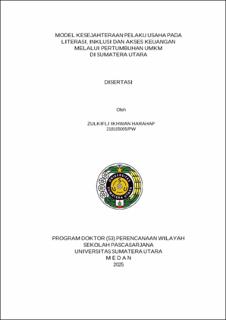Model Kesejahteraan Pelaku Usaha pada Literasi, Inklusi dan Akses Keuangan Melalui Pertumbuhan UMKM di Sumatera Utara
The Impact of Financial Literacy, Inclusion, and Access on SME Growth and Welfare in North Sumatera: A Mediating Role of Business Growth

Date
2025Author
Harahap, Zulkifli Ikhwan
Advisor(s)
Lubis, Satia Negara
Aritonang, Evawany Yunita
Erlina
Metadata
Show full item recordAbstract
The main objective of this study is to analyze and prove the influence of financial literacy, financial inclusion and financial access on welfare through the growth of SMEs in North Sumatra Province. The analytical method used in this study uses explanatory research, which is a study that intends to explain the position of the variables studied and the relationship between one variable and another. Data was taken from SME actors in North Sumatra Province using 306 respondents. The data analysis technique used Structural Equation Modeling (SEM) analysis. The results of this study prove that financial literacy has a significant effect on the growth of SMEs in North Sumatra Province. Financial inclusion has a positive and significant effect on the growth of SMEs in North Sumatra Province. Financial access has a positive and significant effect on the growth of SMEs in North Sumatra Province. Financial literacy does not have a significant effect on the welfare of SMEs in North Sumatra Province. Financial inclusion has a positive and significant effect on the welfare of SMEs in North Sumatra Province. Financial access has a positive and significant effect on the welfare of SMEs in North Sumatra Province. Growth has a positive and significant effect on the welfare of SMEs in North Sumatra Province. Growth cannot mediate the relationship between financial literacy and welfare in SMEs in North Sumatra Province. Growth can mediate the relationship between financial inclusion and welfare in SMEs in North Sumatra Province. Growth can mediate the relationship between financial access and welfare in SMEs in North Sumatra Province. The implications of the results of this study prove that the role of banking in providing access and financial inclusion is very effective in increasing the growth and welfare of SMEs. The novelty of this study produces a model of the influence of financial literacy, financial access, and financial inclusion through growth on welfare. This study produces ideas on how these factors can be optimized to improve welfare through growth in an economic context that has structural and systemic challenges. The implications of the results of this study contribute to providing new insights for inclusive development policies on how policies that support increasing financial literacy and financial inclusion can stimulate growth and improve the welfare of business actors.
